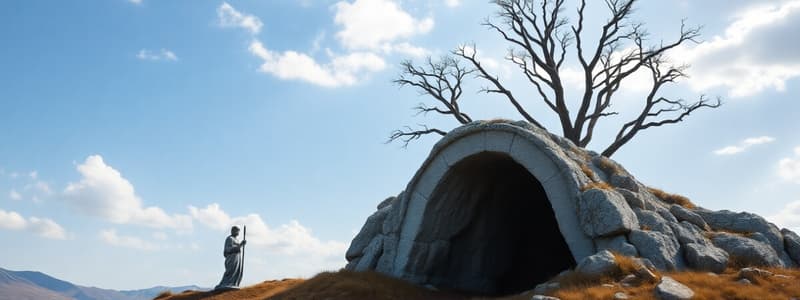Podcast
Questions and Answers
What was Plato's view on Athenian democracy as expressed in 'The Republic'?
What was Plato's view on Athenian democracy as expressed in 'The Republic'?
- It is the best form of governance.
- It encourages individual freedom.
- It should be preserved at all costs.
- It is preferable to be ruled by philosopher kings. (correct)
The allegory of the cave suggests that the physical world is a perfect reflection of ideal forms.
The allegory of the cave suggests that the physical world is a perfect reflection of ideal forms.
False (B)
What fundamental questions does the cave allegory raise?
What fundamental questions does the cave allegory raise?
The origin of knowledge, the problem of representation, and the nature of reality.
Plato's allegory of the cave argues that the masses are too _____ and ignorant to govern themselves.
Plato's allegory of the cave argues that the masses are too _____ and ignorant to govern themselves.
Match the concept to its description:
Match the concept to its description:
What did Plato make an analogy for in the Allegory of the Cave?
What did Plato make an analogy for in the Allegory of the Cave?
According to Plato, the shadows in the cave represent real entities.
According to Plato, the shadows in the cave represent real entities.
What does the sunlight symbolize in Plato's Allegory of the Cave?
What does the sunlight symbolize in Plato's Allegory of the Cave?
In Plato's Allegory of the Cave, the prisoners are chained in a _______ since birth.
In Plato's Allegory of the Cave, the prisoners are chained in a _______ since birth.
Match the following terms with their meanings in the context of Plato's Allegory of the Cave:
Match the following terms with their meanings in the context of Plato's Allegory of the Cave:
Flashcards are hidden until you start studying
Study Notes
Plato's Allegory of the Cave
- Plato, a Greek philosopher, wrote "The Republic", which includes his famous Allegory of the Cave.
- The allegory is about a group of prisoners who have lived in a cave since birth, chained and forced to watch shadows cast by firelight on a wall.
- These shadows are the only reality they know; they believe they are perceiving real entities.
- One prisoner is freed and brought outside, initially disoriented by sunlight and unable to believe that things outside the cave are real.
- After adjusting, the freed prisoner sees the outside world, including the ultimate source of light, the Sun.
- The prisoner returns to the cave, but is no longer used to the darkness and struggle to see the shadows on the wall.
- Other prisoners reject the outside world and resist attempts to free them, associating the freed prisoner with blindness and stupidity.
Interpretation and Significance
- This allegory represents the process of enlightenment: leaving the comfort of ignorance and seeking true knowledge.
- Plato uses the allegory to criticize the Athenian democracy, arguing that the average person is too ignorant to govern themselves.
- The allegory also connects to Plato's Theory of Forms, a philosophical idea that physical objects are imperfect reflections of ideal forms like roundness or beauty.
- The allegory raises many philosophical questions regarding the nature of reality, the origin of knowledge, and the limitations of perception.
- This allegory is interpreted in different ways depending on the interpretations and perspectives: theologians, philosophers of language, and others.
- The allegory serves as a reminder to question what we believe and to be open to new knowledge, even if it challenges our comforting illusions.
- The final message emphasizes the importance of choosing knowledge despite the potential cost.
Studying That Suits You
Use AI to generate personalized quizzes and flashcards to suit your learning preferences.




